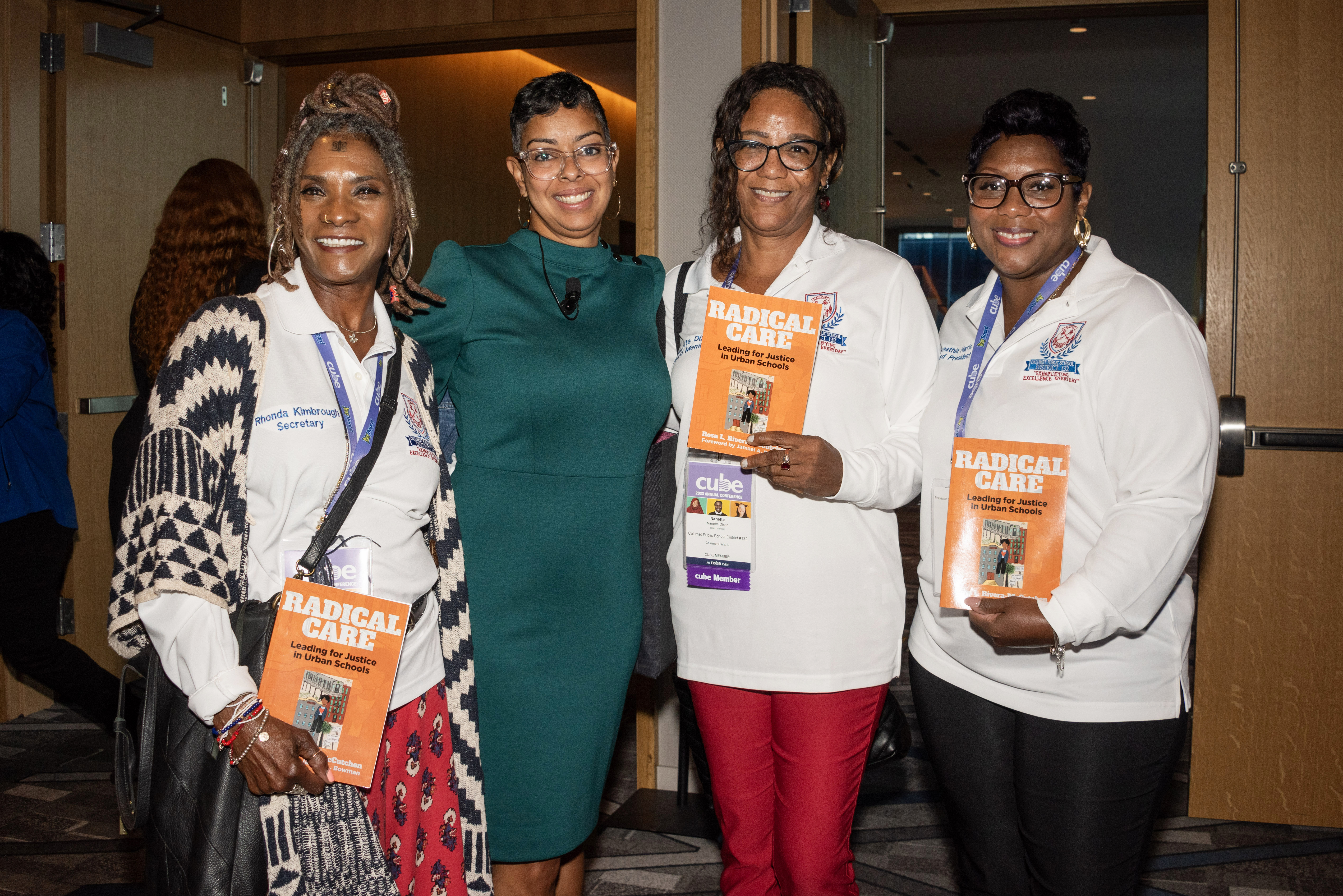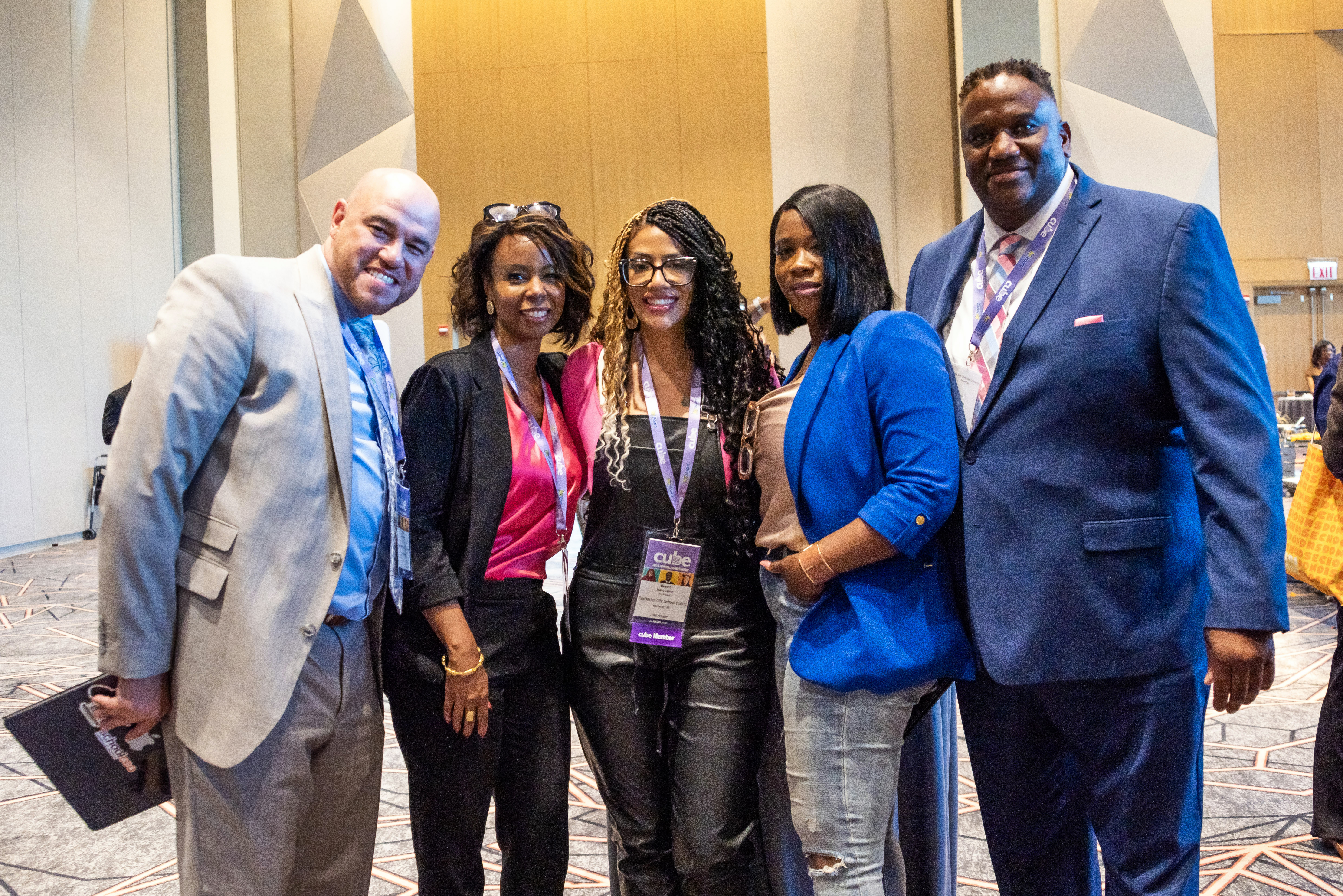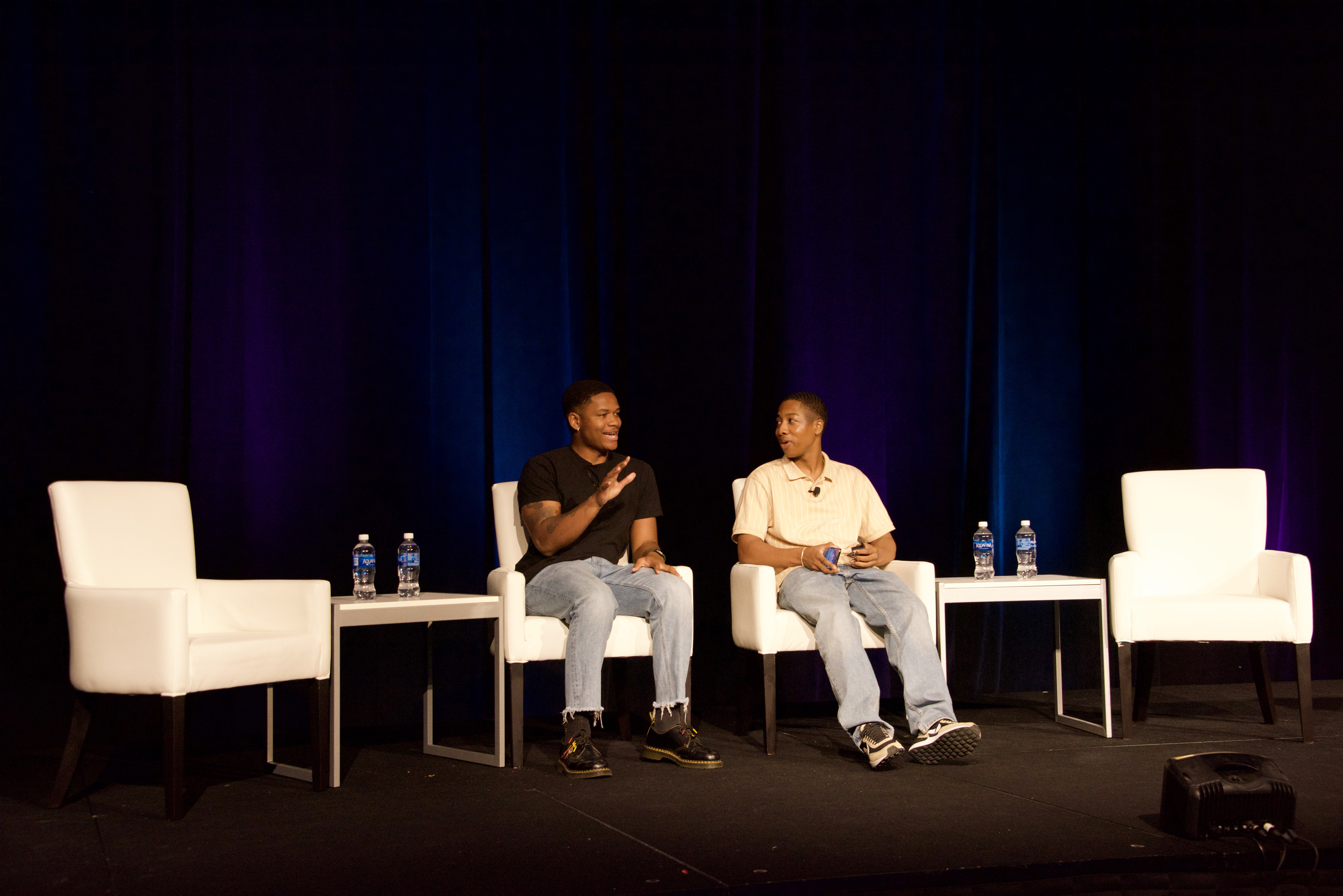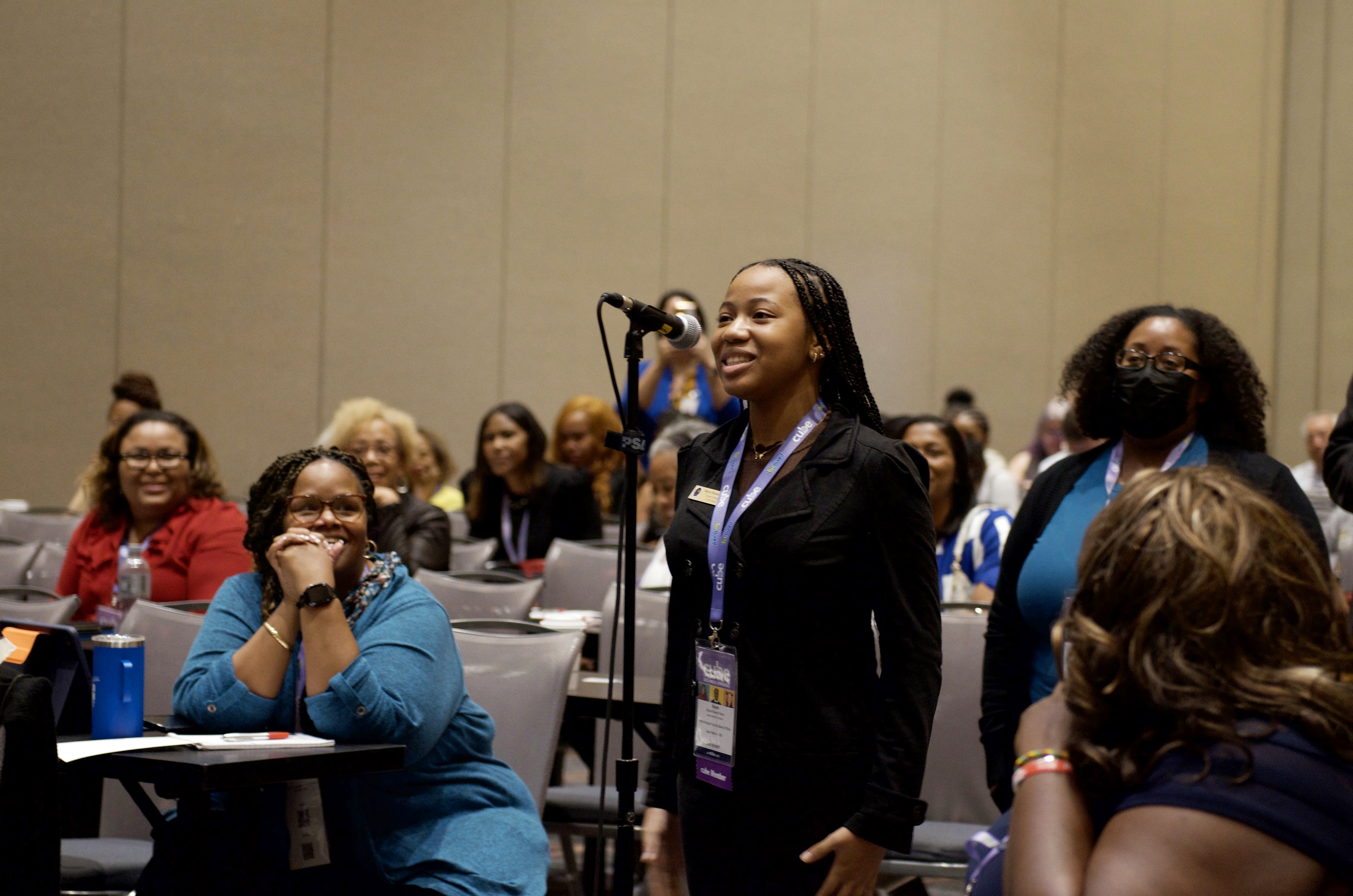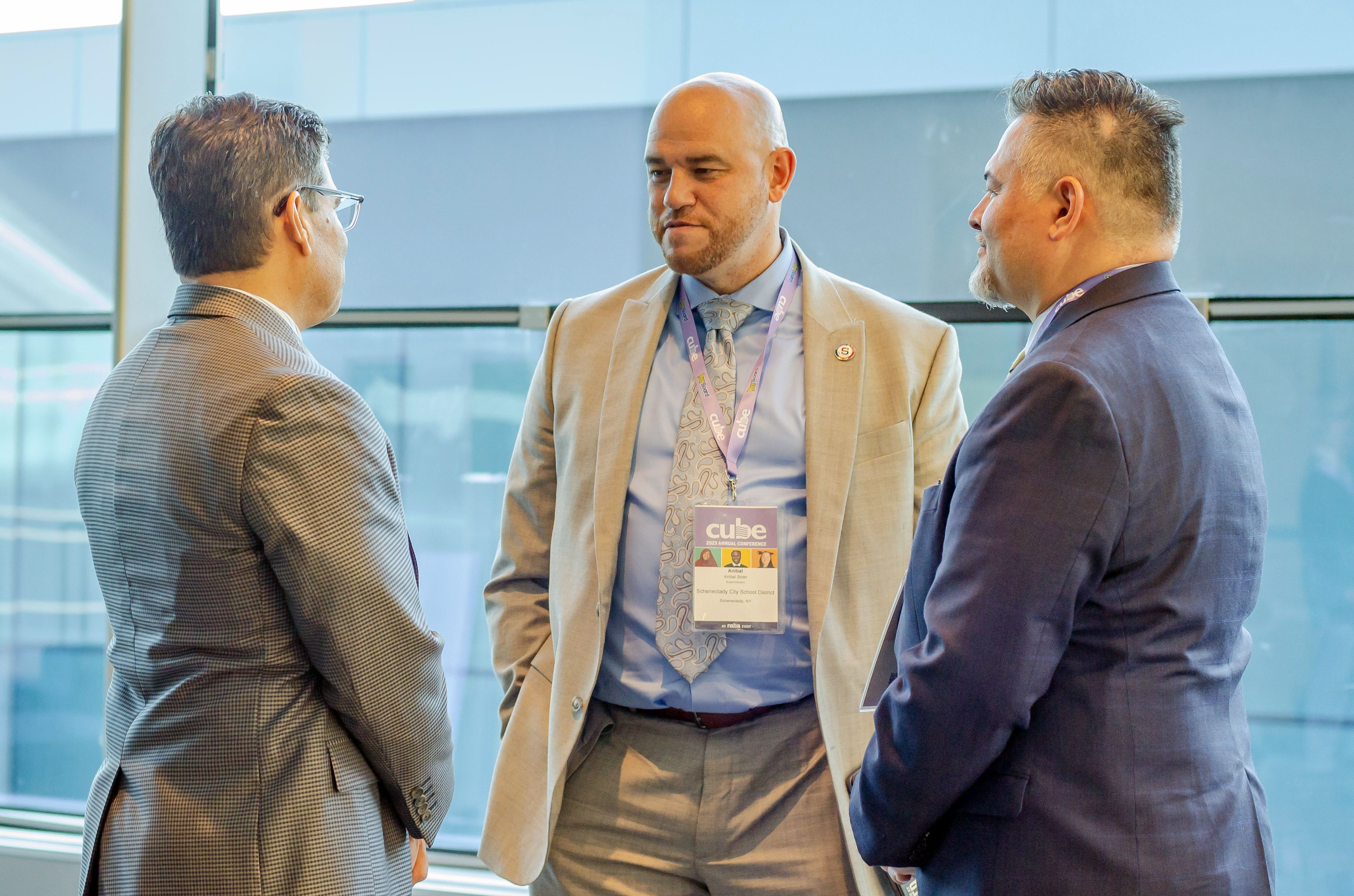Thank you to the board members and education leaders from districts across the country for joining us in Las Vegas for the CUBE 2024 Annual Conference.

CUBE has convened school board members from across the nation for the past 56 years to network and share the continually evolving strategies they are using to address the unique educational challenges that exist in our nation's urban centers. Content is curated specifically to provide you with the tools and support you need to effect change as an empowered, impactful urban school board member.

| Registration | Registration Deadline | CUBE Districts/NATCON Districts/Member State Association Staff | General (Non-CUBE Districts/Non-NATCON Districts/Non-Member Associations) | Guest* |
| Early Bird | Before July 19 | $550 | $675 | $195 |
| Standard | After July 19 | $650 | $775 | $195 |
*A guest registration grants access to the Welcome Reception and CUBE Urban Night Out (UNO) only. Your guest must purchase a registration if planning to attend sessions, networking meal events, evening receptions, and CUBE Urban Night Out (UNO).
| 3 – 6 p.m. | Early Registration Sponsored by Amplify |
| 7:30 a.m. – 5 p.m. |
Registration Sponsored by Amplify |
| 8 – 11:30 a.m. | Site Visits |
| 10:30 – 11:45 a.m. | Preconference Breakout Sessions |
| Noon – 2 p.m. (Doors open 11:45 a.m.) | The State of Urban Education Luncheon Sponsored by DLR Group |
| 2:15 – 3:30 p.m. | Breakout Sessions |
| 3:45 – 5 p.m. | Breakout Sessions |
| 6:30 – 9:30 p.m. | Urban Night Out (UNO) at Drai's Las Vegas Sponsored by Intuit, McGraw Hill, SFE, and United Healthcare |
| 7:30 a.m. – 5 p.m. |
Registration Sponsored by Amplify |
| 7:30 – 9 a.m. | Networking Breakfast Sponsored by Sparq |
| 9 – 10:15 a.m. | Keynote Presentation Sponsored by Sodexo |
| 10:30 – 11:45 a.m. | Breakout Sessions |
| Noon – 2 p.m. (Doors open at 11:45 a.m.) |
Keynote Presentation: Michael D. Smith, Chief Executive Officer, AmeriCorps Awards Luncheon: Sponsored by U.S. Army
|
| 2:15 – 3:30 p.m. | Breakout Sessions |
| 3:45 – 5 p.m. | Breakout Sessions |
| 5 – 6:30 p.m. | CUBE Sunset Social Sponsored by ESS/Proximity Learning and HES Facilities |
| 7:30 a.m. – Noon | Registration Sponsored by Amplify |
| 10 a.m. – Noon (Doors open at 9:30 a.m.) | Closing Brunch & Fireside Chat Sponsored by National School Boards Action Center (NSBAC) |
CUBE First-Time Attendees Informational Session & Meet-and-Greet
Join CUBE Chair Gill Garrett as he provides first-time CUBE Conference attendees with a detailed overview of what to expect and what can’t be missed at this year’s conference. The session also will be an opportunity to meet with and network with other attendees from across the country and learn more about the benefits of joining the national CUBE network.
Speaker:
Gill Garrett, Chair, Council of Urban Boards of Education, Pontiac School District Board of Education (MI)
Navigating the Challenges of School Board Leadership: Avoiding Common Pitfalls
School board members are vital to shaping the future of education in their communities, yet they increasingly face challenges that can lead to legal, ethical, and public relations problems. This session will explore recent high-profile cases of school board members across the country who have encountered legal and ethical troubles. Participants will gain insights into the most common pitfalls —such as conflicts of interest, transparency issues, misuse of resources, and breaches of confidentiality.
Attendees will learn proactive strategies for avoiding these hazards, ensuring that their board service remains focused on the best interests of students and the community. Through real-world examples, interactive discussions, and expert advice, school board members will leave with practical tools to enhance governance, build trust, and maintain accountability in their districts.
Speaker:
Micah Ali, CUBE Chair Emeritus, President, Compton Unified School District Board of Trustees (CA)
“Sparks”: Leveraging Funding for Better Outcomes
In our changing world, architects and planners must better balance a client’s educational vision with student and teacher engagement, policy and implementation, and the realities of first-cost capital and long-term operating budgets. This approach best leverages investments in facilities to ultimately improve learning outcomes through architecture that enables. At DLR Group, we see planning and design as an iterative loop informed by research both pre- and post-occupancy. Over the past 10 years, we have seen substantial priority shifts with our clients across the country. As we have worked together shaping outcomes that represent a broad range of ideas, qualities, and activities, the importance of cultural context and equity affecting change has become increasingly important.
Speakers:
Pamela Loeffelman, FAIA, LEED AP, K12 Education Leader | Senior Principal, DLR Group
Micah Ali, Board President, Compton Unified School District (CA)
James D. French, FAIA, Global Education Leader | Senior Principal, DLR Group
Working for Equity in Equity-Adverse Environments
In many communities across the U.S. today, and particularly in the South, equity is not only an under-addressed issue but increasingly a forbidden concept. As school boards and states create policies and legislation banning or muddying equity-related initiatives, and sometimes even forbidding the use of the word “equity,” the work to improve student opportunities and outcomes and to recognize and address injustice continues. The recent attacks on equity are often particularly relevant in urban communities. These communities may stand to gain the most from the sort of work to challenge the disparities currently being limited (and, especially in the case of larger urban districts, may also be singled out at the state level for additional limitations around things like diversity, equity, and inclusion). In this session, we will share challenges — and, in some cases, solutions — experienced by the Equity Assistance Center-South, a federally funded technical assistance center (with "equity" in its title) that provides support across multiple equity areas, including race and gender. We will discuss strategies for moving equity work forward within the current environment and potential approaches to effectively push back on equity limitations.
Speakers:
Max Altman, Director of Research and Policy, Southern Education Foundation
Eshé Collins, Director, Equity Assistance Center-South, Southern Education Foundation
Danielle Harris, Program Manager, Equity Assistance Center-South, Southern Education Foundation
Strategic Collaboration: Utilizing a School Board Equity Council and Leadership to Advance Goals
The session will address how Ogden School District has utilized a District and Community Equity Council, including school board members and community partners, to move the district's strategic plan forward through a focus on equity and access for students and stakeholders. Specifically, how the work of the Equity Council supported Ogden School District’s work toward closing achievement gaps among all student groups, including significantly increasing graduation rates and opportunities for students in rigorous coursework. This session also will address how the council has strategically supported Ogden’s efforts toward moving the needle in early literacy achievement largely in part to staff retention and recruiting and developing a talented workforce. Ogden has unprecedented numbers in staff retention and has been able to recruit and develop teachers that match our student demographics through a Grow Your Own Program. Ogden also has been able to build culture and trust with teachers and staff through a systematic approach to gathering data and collective problem solving. This work created trust and broke down barriers and misunderstandings in the community.
Speakers:
Luke Rasmussen, Superintendent, Ogden School District (UT)
Arlene Zisumbo Anderson, Board Member and Vice President, Ogden School District (UT)
Heather Gerrard, Executive Director of Pathways, Ogden School District (UT)
Jessica Bennington, Executive Director of Human Resources, Ogden School District (UT)
Unveiling the Path to Equitable Education: Empowering K-12 Schools Through Equity Audits
In this dynamic and interactive session, participants will dive into the crucial concept of equity audits in K-12 education. We will explore the purpose and significance of equity audits, understand the key components involved, and learn how to conduct and implement them effectively. By examining real-world case studies and engaging in hands-on activities, attendees will gain practical strategies and tools to promote equity, identify systemic barriers, and foster inclusive learning environments within their schools.
Speakers:
Michael Dodge, Trainer, Massachusetts Association of School Committees (MASC); Executive Vice President for Academic Affairs and Student Life, American International College Supervisor
Stefania Raschilla, Superintendent, West Springfield Public Schools (MA)
Empowering Schools as Community Hubs: Strengthening Educational and Community Ties
This session will explore the transformative role of schools as central hubs for both educational and community support, with a focus on enhancing educational equity in urban communities. We will explore how schools can leverage partnerships with local organizations, faith-based programs, and community resources to provide holistic support to students and families. The session will emphasize the pivotal role of school leaders in fostering and maintaining strong school-community relationships. School board members will gain a deeper understanding of the importance of supporting school leaders in these efforts. Practical initiatives discussed will include improving digital infrastructure, facilitating access to online learning tools, and enriching after-school programs. Attendees will gain insights into successful case studies and actionable strategies highlighting the need for increased support for school leaders to build robust, mutually beneficial relationships with community stakeholders. These efforts are essential for creating inclusive and supportive environments that promote educational equity and community well-being, ensuring all students have the opportunity to succeed.
Speakers:
Dennis B. McKesey , Ed.D., Educational Leader, The Off School Grounds Coalition (OSG)
Dr. Meisha Porter, Visiting Senior Fellow, Center for Educational Innovation (CEI) & Former Chancellor, New York City Department of Education
Big Board Behavior: Bold Moves, Big Results
Explore the vital connection between courage, professional development, and effective governance. Equip yourself to govern effectively by learning proven best practices that will empower you to lead with confidence. Elevate your board skills to be proactive and prepared. Hear from a recently retired school board member who successfully navigated significant change, even during the challenges of the pandemic. This session will highlight essential board behaviors that every school board member should embody to serve students, educators, and the community at large, driving bold, systemwide results.
Speakers:
Channel Powe, Consultant, Diligent
Now What? From Creating Policy to Changing Practice to Close Achievement Gaps
Boards of education can implement well-intentioned equity policies without achieving equitable learning outcomes. This is because equity policies, vision and mission statements, and procedures seldom address HOW to improve student learning in meaningful ways. Boards and school leaders who support equity often do not know how to change instructional practices to meet student needs. Closing achievement gaps requires building each school’s capacity to maximize student growth by supporting key instructional practices for every student in every classroom every day.
In this session, participants will:
Speaker:
Dr. Teresa Hill, Superintendent, South Holland School District 151 (IL)
Early Detection, Early Intervention: The Power of Universal Screening in Schools
This session delves into the critical role of universal screening in identifying students' needs and providing timely interventions. Participants will gain insights into the significance of early detection and how to use their data to align systems, including strategies, policies, people, and processes to provide intervention for academic success and socio-emotional well-being.
Speakers:
Marsha Herron, Ph.D., Director of Student and Organizational Success, Oklahoma State School Boards Association (OSSBA)
Jessica Hawkins, Director of Community and Systems Initiatives, Healthy Minds Policy Initiative
Armisha Harris, Director of Mental Health, Oklahoma City Public Schools
Reclaiming the Narrative About Educational Equity & Why It Matters for Every Student
In today's hyper-polarized environment, terms such as "equity," "CRT," "Social-Emotional Learning," "school choice," “DEI,” and "parental rights" have been misconstrued and misunderstood to the point that they can cause school board members and administrators to experience a fight, flight, freeze, or fawn reaction. School leaders need to have a solid understanding of these terms — what they do and do not mean, as well as their origins — so we are well-prepared to help our communities engage in the work associated with these important topics. In this session, we will review some of these terms; we will discuss proven strategies for building a foundation of shared language and understanding across political divides; and we will reserve a few moments to refill your cup as education leaders. Participants will come away with tools, strategies, and practical examples for addressing common misinformation around these "hot" topics in a way that invites people of all demographics and backgrounds into productive dialogue about the educational equity issues affecting many of our students and families.
Speakers:
Mary Fertakis, CEO, M Fertakis Consulting, LLC
J.Marie Richie, Founder and Principal, J. Marie & Associates
Equity-Focused Board Governance: Acceleration Through Innovation, Advocacy and Action
At Ypsilanti Community Schools, we lead through an unwavering commitment to equity that values and honors voice, choice, and agency by creating opportunities that ensure a strong sense of belonging for all. This session is designed to help board trustees understand the importance of leading with an equity-focused lens that results in better student outcomes by investing in equitable innovation opportunities. Our commitment to our vision for Acceleration Through Innovation, Advocacy, and Action speaks to our common purpose and the precision of our collective work together by adopting an equity-focused mission, vision, and strategic plan; adopting equity policies; allocating equitable resources; adopting a culturally responsive curriculum that ensures all students are seen, heard, understood, valued, respected, and cared for; and having equitable tools for the adoption of equitable resources. We will share the strategies we use in making informed decisions that directly impact the lives of our students and community. This equity-focused work can be possible when we lead with data, embed culturally responsive practices, cultivate cultural awareness and proficiency, analyze policies and practices, and ensure we incorporate equity in our decisions.
Speakers:
Dr. Celeste Hawkins, Board of Education President, Ypsilanti Community Schools (MI)
M. Jeanice Townsend, Board of Education Treasurer, Ypsilanti Community Schools (MI)
Yvonne Fields, Board of Education Trustee, Ypsilanti Community Schools (MI)
Sharon Lee, Board of Education Vice President, Ypsilanti Community Schools (MI)
Dr. Alena Zachery-Ross, Superintendent, Ypsilanti Community Schools (MI)
Dr. Carlos Lopez, Assistant Superintendent, Ypsilanti Community Schools (MI)
Closing the Advanced Coursework Opportunity Gap
Research shows that access to advanced coursework is a key indicator of student readiness and achievement in post-secondary life. The academic rigor and expectations associated with advanced-level courses create the opportunity for students to gain the educational and career-connected skills necessary to thrive in life beyond high school. However, the advanced coursework system is still full of opportunity gaps that have a significant impact on which students choose to enroll and who gets to reap the benefits. Learn how district leaders from Hillsborough County Public Schools (FL), the seventh largest school district in the U.S., increased equity in their highly diverse school communities by implementing the Cambridge International Education system.
Speakers:
Colleen Faucett, Chief Academic Officer, Hillsborough County Public Schools (FL)
Jazheel Lenegar-Brown, Executive Director, Instructional Support, Hillsborough County Public Schools (FL)
Collaboration for Student Success Resources
Is your district or school community struggling with inequitable student outcomes or teacher retention? Research shows that school communities with strong collaborative practices yield higher student achievement and higher teacher retention. But how do you get started, and how do you implement these practices effectively? The National Labor Management Partnership, made up of the nation's education associations, has authored a guidebook and set of tools to help! In this interactive session, you will learn the case for collaboration, how to get started, and what resources are available to create successful partnerships that benefit your students and community.
Speakers:
Andrea Walker, Director of Strategy, National Education Association (NEA)
Jinghong Cai, Senior Research Analyst, National School Boards Association (NSBA)
Thriving Under Pressure: Managing Trauma and Triggers as a School Board Director
This session is designed to equip school board members with essential tools for managing trauma, recognizing triggers, and practicing self-care. In this session, participants will gain a deep understanding of how personal well-being impacts their effectiveness as leaders. By fostering resilience and mental health, board members can make better decisions, handle stress, and remain focused on their mission. This session also will address how these practices contribute to educational equity in urban communities. When board members are mentally and emotionally healthy, they are better positioned to advocate for policies and practices that support all students, particularly those from marginalized backgrounds. This, in turn, helps create a more inclusive and equitable educational environment where every student has the opportunity to succeed. The session includes interactive activities, practical self-care strategies, and a guided self-care plan development, ensuring participants leave with actionable steps to enhance their personal well-being and leadership capabilities.
Speakers:
Dr. Courtney M. Graves, School Board Director, Ferguson-Florissant School District (MO)
Emerging Technologies and Their Role in Empowering Urban Youth for the Future Workforce
This session delves into the critical role of emerging technologies, including AI, in shaping educational equity and preparing urban students for the future workforce. With a focus on how these technologies can be ethically implemented to benefit all students, we explore practical strategies to address and overcome the historical and systemic barriers that often sideline urban youth. Our diverse panel of experts, from educators to tech innovators, will offer insights and recommendations to ensure that these technologies serve as tools of empowerment rather than exclusion, fostering an environment where urban students are equipped with the skills and knowledge to thrive in an increasingly digital world.
Speakers:
Dr. Jhone Ebert, Superintendent of Public Instruction- Nevada DOE
Dr. Jesse Welsh, Chief Executive Officer at Nevada State High School
Dr. Louis Markouzis, Associate Superintendent for Clark County
Nurturing New Arrival Students: A Holistic Approach to Mental Health and Community Support
Within Denver Public Schools, we have dedicated ourselves to cultivating a supportive environment for New Arrival Students by prioritizing mental health and holistic well-being. Through integrating trauma-informed and trauma-specific interventions, culturally responsive practices, and proactive community engagement and partnerships, we have developed robust internal systems and have continued to foster diverse partnerships to address the multifaceted needs of our student body. Our presentation will spotlight the collaborative efforts undertaken to ensure equitable access to mental health resources, navigate basic needs services, and provide culturally relevant support for New Arrival students. By sharing our strategies, successes, and lessons learned, we aim to provide participants with innovative tools and resources that will lead to systemic change anchored in equity for New to Country Students. We hope to inspire fellow urban educators and administrators to embrace a comprehensive approach to student support that honors individual experiences and fosters a sense of belonging within our diverse urban communities.
Speakers:
Meredith Fatseas, Director of Mental Health, Denver Public Schools (CO)
Taha Zaffar, Senior Manager of Social Work and Mental Health, Denver Public Schools (CO)
Decide to Lead
The Decide to Lead session focuses on becoming an Army Officer as a specialized path of service for aspiring leaders. This session will share the Army’s call on high-performing, goal-oriented youth from all backgrounds to consider their leadership aspirations, positioning Army Officers as the ultimate launch pad for the career and lifestyle they seek. This session reminds us that leaders are not born; they are made. Beginning that transformation starts with a simple choice: the decision to lead. The Army’s goal is to increase leadership diversity by recruiting Officers who represent communities across the country. How do we do this? The U.S. Army Cadet Command partners with over 900 colleges and universities across the nation to recruit, educate, develop, and inspire Senior ROTC Cadets to commission officers of character for the Total Army. Each year, through ROTC, the Army commissions more than 5,300 Lieutenants to serve in our active component, or part-time in your communities as members of the State National Guard or Army Reserve. In addition to our work at the Senior level, the Army partners with 1,744 high schools to conduct JROTC; a program designed to develop citizens of character for a lifetime of commitment and service to the nation.
Speakers:
Colonel Michael G. McLendon, Professor of Military Science, The Citadel
Mr. John Quinene, Instructional Systems Specialist, Junior ROTC, U.S. Army Cadet Command
National Service as a Critical Post-Secondary Pathway
Young people are increasingly choosing alternative pathways to explore potential careers and gain experience. They also are eager to give back to their communities at different points of their educational journey through service in a wide variety of areas, from education to healthcare to climate change mitigation. Therefore, it is critical that students, their families, their educators and advisers, and school board members are aware of the opportunities available for them to leverage their leadership skills to create lasting change within their communities and beyond through service with AmeriCorps, the only federal agency focused on service and volunteerism. Each year, AmeriCorps provides opportunities for more than 200,000 members and volunteers to give back to their communities while gaining new and critical skills and knowledge. During this interactive session, school board members will learn how a term of national service with AmeriCorps provides flexible and diverse opportunities for young adults to build professional and personal skills, explore different career paths while gaining hands-on experience, practice social bridging, and respond to the most pressing needs within their local communities or other communities throughout the U.S. while earning a stipend and money for future education. They will leave with practical tips on how to ensure all students in their school districts are aware of national service as a post-secondary pathway and with information on how AmeriCorps members can provide critical support to advance the district’s priorities.
Speaker:
Terra Wallin, P-12 Education Advisor, AmeriCorps
Courtney Coleman, Recruitment Specialist, AmeriCorps
The SEAT of Power: A Districtwide Approach to Creating Space for Student Voice
In the pursuit of educational equity, students' voices are not just valuable; they are essential to cultivating an environment where students can belong, grow, and succeed. By actively providing impactful opportunities to communicate student needs, engage youth as problem solvers, and then act on student feedback with an equity lens, school districts can ensure that policies and practices truly reflect the diverse needs and experiences of their student body.
Come explore how the Anne Arundel County Public Schools’ “Student Equity Advisory Team (SEAT) Program,” which is directly aligned to the district’s Educational Equity Policy, empowers its students to use their voice to impact educational equity. Learn about the unique SEAT structure and model of support that has resulted in school-based administrators and other leaders incorporating student feedback into educational practices that create joyful learning environments where students explore opportunities, discover their passions, and develop their skills. This session will inspire you to pull up a chair and create your own model for students to have a SEAT at the table!
Speaker:
Katara West, Senior Equity Specialist, Anne Arundel County Public Schools (MD)
Using Strategic Priorities to Turn Around a School District: A 3-Step Process
In the Plainfield Public School District, ensuring equity through transparent relationships between all collaborators has translated into a targeted budget process that has profoundly affected the community. Transparent relationships between our Superintendent and Board of Education have been crucial for decision-making, fostering trust, inclusivity, and effective governance. This session will explore how creating these transparent relationships has significantly enhanced our ability to gain consensus in board rooms, particularly focusing on their potential to advance educational equity in urban communities.
Encouraging honest dialogue and openly sharing information can help board members understand diverse perspectives, leading to more informed and equitable decisions. Actively involving all stakeholders, including those from underrepresented communities, ensures that decisions reflect the needs and aspirations of the entire community. Establishing clear accountability mechanisms ensures that decisions related to the budget process are fairly implemented and that progress is monitored and evaluated.
Speaker:
Rashon K. Hasan, Superintendent, Plainfield Board of Education (NJ)
Hanae Wyatt, Board President, Plainfield Public Schools, CUBE Steering Committee Member
Career Ready in Reading, PA: There is More Than One Way to Graduate
Some students struggle with traditional education, high school graduation, and do not have a post-graduation plan. At the same time, businesses are struggling to find candidates with the training necessary to succeed in skilled, entry-level trade positions — interpersonal communication, problem-solving skills, and a teamwork mindset. This session will introduce innovative programs in the Reading School District, a large urban school district in Reading, Pennsylvania, that offer students an alternative approach to education, focusing on career readiness and experiential learning. Join us to learn about these transformative initiatives that celebrate the diversity of learning pathways and champion a brighter future for both students and local businesses.
Speakers:
Dr. Jennifer Murray, Superintendent, Reading School District (PA)
JuliAnne Kline, Assistant Superintendent, Reading School District (PA)
Simple Conversations for Stronger Teachers
Quick, think of a teacher you know. Odds are you picked someone who is at least part superhero. But odds are also that that person is dealing with the same stress, anxiety, and everyday mental health problems that are plaguing our favorite profession. And while many school systems are trying to fix it, few are moving the needle. Meanwhile, the answer is right in front of us and already part of our days. Simple conversations have the power to drastically improve the mental health of our teachers. When structured properly, these conversations can be in person, online, or even between an AI chatbot and a human.
Speakers:
Dr. Mark Briesacher, Chief Physician, Lore
Brad Ehlert, Education Market President, Lore
One Classroom, One Film, Now a Nationwide Literacy Solution (formerly entitled District Success Stories: How We’re Ensuring All Students Are Fluent Readers)
“The Right to Read” documentary tells the story of how one teacher used a structured literacy approach to skyrocket the reading proficiency of students at the lowest-performing school in Oakland, CA. When COVID hit, instead of stalling students’ progress, the same instructional approach achieved outstanding results over video. What started in one teacher’s classroom has now grown into a one-to-one online tutoring program that is closing foundational reading skills gaps for students across the country and turning them into fluent readers. Hear the behind-the-scenes story of the film and learn about the impact of the national movement it catalyzed.
Speakers:
Jessica Sliwerski, CEO and Co-Founder, Ignite Reading
Dr. Almi Guajardo Abeyta, Ed.D., Superintendent, Chelsea Public Schools (MA)
State of Urban Education
Sponsored by DLR Group
CUBE Chair Gill Garrett will provide updates and insights on the current state of urban education, along
with his motivational messaging on continuing to build and support excellence in urban school board leadership.
There will be a Q&A session at the end of the address. Questions must be submitted in advance. Click here to submit your questions.
Speaker:
Gill Garrett, Chair, Council of Urban Boards of Education, Pontiac School District Board of Education (MI)
Policy That Demands Equity — Ensuring All Students Have the Schools They Deserve
Sponsored by Sodexo
While state and federal legislation drives much of what takes place in public schools, local school boards are the real engines of policy that determine what happens in our schools across the country. As local school board members consider local policies (and the practices that implement them), we must guarantee that such policies drive equity, opportunity, and access for every student. Ensuring that our students have every opportunity to step into their brilliance must be our top priority.
In this keynote, Rocío Inclán, senior director of the National Education Association’s Center for Racial and Social Justice, will explore practical, actionable strategies that empower education leaders in their work to make certain that every student has the chance to reach their full potential. Together, we will achieve this goal by driving equity, supporting teachers, and fostering policies that cultivate brilliance in every classroom. Together, we will envision a future where your leadership is the catalyst for meaningful change and where every student has the opportunity to thrive.
Speaker:
Rocío Inclán, Senior Director, Center for Racial and Social Justice, National Education Association (NEA)
Harnessing the Power of National Service for a Brighter Tomorrow
In an illuminating keynote, AmeriCorps CEO Michael D. Smith will share how service has the power to save us — to save our neighborhoods, our cities, the nation, and even ourselves. Throughout his life, Michael has witnessed the transformative power of service, and he sees it every day as the head of the federal agency for national service. He knows firsthand that service changes lives, and he continues to be inspired by the sacrifice of our nation's volunteers. It is his intent that you leave this session inspired to serve others in a way that propels all of us toward a brighter future.
There will be a Q&A session at the end of the keynote. Questions must be submitted in advance. Click here to submit your questions.
Speaker:
Michael D. Smith, Chief Executive Officer, AmeriCorps
The Power of Arts and Culture in Education
Sponsored by National School Boards Action Center (NSBAC)
This fireside chat will feature the stars of the beloved sitcom “Living Single” — Kim Coles, Kim Fields, and Erika Alexander. The special session will delve into the personal and educational journeys that helped shape who they are today, along with the pivotal role that arts and culture play in shaping a rich and inclusive learning environment.
Our celebrated guests will share experiences, challenges, and triumphs from their educational backgrounds, shedding light on how the arts have influenced their paths. They will discuss the transformative power of integrating arts into education, highlighting how it can cultivate creativity, build cultural awareness, and foster a more engaging and supportive learning atmosphere for all students.
Speakers:
Erika Alexander, Actress, Activist, Film Director, Producer
Kim Coles, Motivational Speaker, Coach, Host, Author, Actress, Comedian
Kim Fields, Actress, Director, Producer, Entrepreneur
Headquarter Hotel: Bellagio Hotel & Casino
3600 S Las Vegas Blvd
Las Vegas, NV 89109
The CUBE housing block at the Bellagio Hotel & Casino is now closed. However, sleeping rooms are still available at the prevailing rates at the time of booking. We recommend securing your accommodations as soon as possible to lock in the best available rate.
For alternative hotel options at potentially lower price points, consider the following hotels within walking distance of the Bellagio (please note, NSBA does not have a room block at these properties):
The Cosmopolitan of Las Vegas
Walking Distance: Approximately 5 minutes via a pedestrian bridge.
Vdara Hotel & Spa
Walking Distance: Approximately 10 minutes via an enclosed walkway.
Park MGM
Walking Distance: Approximately 15 minutes.
Ground Transportation
Harry Reid International Airport (Las Vegas)
The Bellagio Hotel & Casino is approximately 5 miles from the Harry Reid International Airport (Las Vegas). Visit the LAS airport website for more information.
Hotel Parking
Valet and self-parking are available at the Bellagio Hotel & Casino.
Q: Will there be an online event for CUBE 2024 Annual Conference?
A: There is no online component for CUBE 2024.
Q: If my state association is not a member, can I register?
A: Yes. Click here to see the pricing.
Q: What is the registration deadline?
A: You can save $100 when you register on or before July 19, 2024. We recommend registering early to secure your spot at the conference.
Q: What is the deadline for online registration?
A: The deadline for online registration is Wednesday, October 23. Registrations after this date will be handled on-site and are subject to availability.
Q: What is the deadline for making an attendee name substitution?
A: The deadline to substitute one attendee's information for another is Wednesday, October 23. If there are any changes after this date, they will need to be handled on-site.
Q: What is included in my registration fee?
A: The full conference registration includes access to all sessions, networking breakfasts, luncheon events, evening receptions, and CUBE Urban Night Out (UNO).
Q: Can I bring a guest?
A: Yes. The guest registration fee is $195. A guest registration grants access to the Welcome Reception and CUBE Urban Night Out (UNO) only. Your guest must purchase a registration if planning to attend sessions, networking meal events, evening receptions, and CUBE Urban Night Out (UNO).
Q: How do I redeem a complimentary registration?
A: Each CUBE district receives one complimentary attendee registration. The attendee using the complimentary registration should contact info@nsba.org for the special registration code. If you are a sponsor, you can find the number of complimentary registrations in the agreement. Sponsors also will receive an email from Karen Miller regarding the number of complimentary registrations their company receives. The email will include information required to get your team registered. Contact Karen Miller at KMiller@nsba.onmicrosoft.com with sponsor-related questions.
Q: What is the event cancellation policy?
A: Requests for refunds can be honored only if made in writing to NSBA at info@nsba.org by Friday, October 4, 2024, and will be subject to a $150 cancellation fee per registrant. No refunds will be honored after that time.
Q: Who do I contact if I have registration questions?
A: Please email info@nsba.org with your questions, indicating CUBE Annual in the subject line.
Q: Is there a credit card authorization form for housing at the hotel?
A: Yes. Please contact bellagiogroupconv5@mgmresorts.com to request a credit card authorization form.
Q: What should I do if I have special dietary needs for meal events?
A: Please email info@nsba.org and indicate the type of allergy or other dietary restrictions. (Please title the email Dietary Needs for CUBE Annual.)
Q: What should I do if I have an ADA request?
A: Please email info@nsba.org if you have any special needs by Friday, October 4, 2024. (Please title the email ADA Accommodations for CUBE Annual Conference.)
Q: How do I report my CEUs earned at CUBE 2024?
A: When the event is over, you will receive a survey link to the email you used to register. After you complete the survey, you will receive a link to a form where you can submit documentation for your CEUs. Contact equity@nsba.org with any questions.
Q: Will session presentations and recordings be available?
A: Session PowerPoints and additional digital handouts are exclusively available through the event app. This event has been planned as an in-person event — no recordings will be available.
Proof of vaccination status or a negative test result is not required to attend NSBA events. Attendees who are not vaccinated are asked to take an at-home COVID-19 rapid antigen test before traveling to the event and should not attend if they test positive or have COVID-19 symptoms. NSBA does not require proof of these measures but encourages attendees to act responsibly and with consideration for the health and safety of others. Mask wearing is optional.

